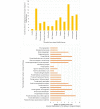In Pursuit of Theoretical Ground in Behavior Change Support Systems: Analysis of Peer-to-Peer Communication in a Health-Related Online Community
- PMID: 26839162
- PMCID: PMC4756252
- DOI: 10.2196/jmir.4671
In Pursuit of Theoretical Ground in Behavior Change Support Systems: Analysis of Peer-to-Peer Communication in a Health-Related Online Community
Abstract
Background: Research studies involving health-related online communities have focused on examining network structure to understand mechanisms underlying behavior change. Content analysis of the messages exchanged in these communities has been limited to the "social support" perspective. However, existing behavior change theories suggest that message content plays a prominent role reflecting several sociocognitive factors that affect an individual's efforts to make a lifestyle change. An understanding of these factors is imperative to identify and harness the mechanisms of behavior change in the Health 2.0 era.
Objective: The objective of this work is two-fold: (1) to harness digital communication data to capture essential meaning of communication and factors affecting a desired behavior change, and (2) to understand the applicability of existing behavior change theories to characterize peer-to-peer communication in online platforms.
Methods: In this paper, we describe grounded theory-based qualitative analysis of digital communication in QuitNet, an online community promoting smoking cessation. A database of 16,492 de-identified public messages from 1456 users from March 1-April 30, 2007, was used in our study. We analyzed 795 messages using grounded theory techniques to ensure thematic saturation. This analysis enabled identification of key concepts contained in the messages exchanged by QuitNet members, allowing us to understand the sociobehavioral intricacies underlying an individual's efforts to cease smoking in a group setting. We further ascertained the relevance of the identified themes to theoretical constructs in existing behavior change theories (eg, Health Belief Model) and theoretically linked techniques of behavior change taxonomy.
Results: We identified 43 different concepts, which were then grouped under 12 themes based on analysis of 795 messages. Examples of concepts include "sleepiness," "pledge," "patch," "spouse," and "slip." Examples of themes include "traditions," "social support," "obstacles," "relapse," and "cravings." Results indicate that themes consisting of member-generated strategies such as "virtual bonfires" and "pledges" were related to the highest number of theoretical constructs from the existing behavior change theories. In addition, results indicate that the member-generated communication content supports sociocognitive constructs from more than one behavior change model, unlike the majority of the existing theory-driven interventions.
Conclusions: With the onset of mobile phones and ubiquitous Internet connectivity, online social network data reflect the intricacies of human health behavior as experienced by health consumers in real time. This study offers methodological insights for qualitative investigations that examine the various kinds of behavioral constructs prevalent in the messages exchanged among users of online communities. Theoretically, this study establishes the manifestation of existing behavior change theories in QuitNet-like online health communities. Pragmatically, it sets the stage for real-time, data-driven sociobehavioral interventions promoting healthy lifestyle modifications by allowing us to understand the emergent user needs to sustain a desired behavior change.
Keywords: behavior change; online social media; smoking cessation; web interventions.
Conflict of interest statement
Conflicts of Interest: None declared.
Figures
Similar articles
-
Pragmatics to Reveal Intent in Social Media Peer Interactions: Mixed Methods Study.J Med Internet Res. 2021 Nov 17;23(11):e32167. doi: 10.2196/32167. J Med Internet Res. 2021. PMID: 34787578 Free PMC article.
-
Content-driven analysis of an online community for smoking cessation: integration of qualitative techniques, automated text analysis, and affiliation networks.Am J Public Health. 2015 Jun;105(6):1206-12. doi: 10.2105/AJPH.2014.302464. Epub 2015 Apr 16. Am J Public Health. 2015. PMID: 25880942 Free PMC article.
-
Effectiveness of Message Frame-Tailoring in a Web-Based Smoking Cessation Program: Randomized Controlled Trial.J Med Internet Res. 2020 Apr 3;22(4):e17251. doi: 10.2196/17251. J Med Internet Res. 2020. PMID: 32242826 Free PMC article. Clinical Trial.
-
The Role of Social Network Technologies in Online Health Promotion: A Narrative Review of Theoretical and Empirical Factors Influencing Intervention Effectiveness.J Med Internet Res. 2015 Jun 11;17(6):e141. doi: 10.2196/jmir.3662. J Med Internet Res. 2015. PMID: 26068087 Free PMC article. Review.
-
A Review of the Theoretical Basis, Effects, and Cost Effectiveness of Online Smoking Cessation Interventions in the Netherlands: A Mixed-Methods Approach.J Med Internet Res. 2017 Jun 23;19(6):e230. doi: 10.2196/jmir.7209. J Med Internet Res. 2017. PMID: 28645889 Free PMC article. Review.
Cited by
-
Development of a framework to promote rural health workforce capability through digital solutions: A qualitative study of user perspectives.Digit Health. 2022 Apr 24;8:20552076221089082. doi: 10.1177/20552076221089082. eCollection 2022 Jan-Dec. Digit Health. 2022. PMID: 35493957 Free PMC article.
-
Behavioural interventions delivered through interactive social media for health behaviour change, health outcomes, and health equity in the adult population.Cochrane Database Syst Rev. 2021 May 31;5(5):CD012932. doi: 10.1002/14651858.CD012932.pub2. Cochrane Database Syst Rev. 2021. PMID: 34057201 Free PMC article.
-
Diabetes Self-Management in the Age of Social Media: Large-Scale Analysis of Peer Interactions Using Semiautomated Methods.JMIR Med Inform. 2020 Jun 30;8(6):e18441. doi: 10.2196/18441. JMIR Med Inform. 2020. PMID: 32602843 Free PMC article.
-
Utilizing Digital Health Technologies for Patient Education in Lifestyle Medicine.Am J Lifestyle Med. 2019 Dec 13;14(2):137-142. doi: 10.1177/1559827619892547. eCollection 2020 Mar-Apr. Am J Lifestyle Med. 2019. PMID: 32231478 Free PMC article.
-
Social Media as a Research Tool (SMaaRT) for Risky Behavior Analytics: Methodological Review.JMIR Public Health Surveill. 2020 Nov 30;6(4):e21660. doi: 10.2196/21660. JMIR Public Health Surveill. 2020. PMID: 33252345 Free PMC article. Review.
References
-
- US Department of Health and Human Services . How tobacco smoke causes disease: the biology and behavioral basis for smoking-attributable disease: a report of the Surgeon General. Atlanta, GA: CDC; 2010. [2016-01-22]. http://www.cdc.gov/tobacco/data_statistics/sgr/2010/ - PubMed
-
- American Cancer Society. [2016-01-22]. Cancer facts and figures http://www.cancer.org/acs/groups/content/@editorial/documents/document/a... .
-
- Gallant MP. The influence of social support on chronic illness self-management: a review and directions for research. Health Educ Behav. 2003 Apr;30(2):170–195. - PubMed
Publication types
MeSH terms
Grants and funding
LinkOut - more resources
Full Text Sources
Other Literature Sources
Medical
Miscellaneous





